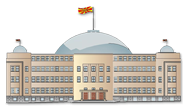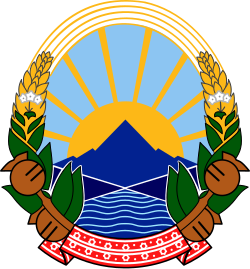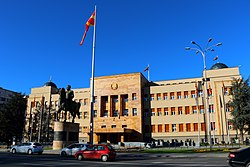Assembly of the Republic of North Macedonia Собрание / Kuvendi | |
|---|---|
 | |
| Type | |
| Type | |
| Established | 1990 [a] |
| Leadership | |
| Structure | |
| Seats | 120 |
 | |
Political groups | Government (75)
Opposition (45) |
| Elections | |
| Proportional representation (D'Hondt method) | |
First election | 11 and 25 November 1990 |
Last election | 8 May 2024 |
Next election | 2028 |
| Meeting place | |
 | |
| Sobranie Palace | |
| Website | |
| sobranie.mk | |
 |
|---|
This article needs additional citations for verification .(February 2024) |
The Assembly of the Republic of North Macedonia [f] is the unicameral legislature of North Macedonia. According to the Constitution, the Sobranie represents the people and is vested with legislative power. It can have between 120 and 140 MPs (currently 120), elected by proportional representation from 6 electoral districts, each contributing 20 MPs, and there are also 3 reserved seats elected from the Macedonian diaspora which are awarded only if the voter turnout was sufficient. MPs are elected for a term of four years and cannot be recalled during their term. The Sobranie is presided over by a President (Speaker). Its organization and functioning are regulated by the Constitution and Rules of Procedure. The Assembly's seat is in the Sobranie Palace in country's capital Skopje.







